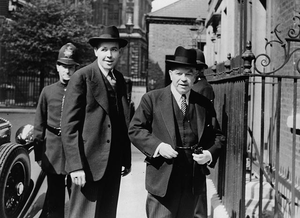Norman Robertson
(diplomat, civil servant, deep state operative) | ||||||||||||||||||||||||||||||||||
|---|---|---|---|---|---|---|---|---|---|---|---|---|---|---|---|---|---|---|---|---|---|---|---|---|---|---|---|---|---|---|---|---|---|---|
 Robertson (left) and Prime Minister Mackenzie King in 1944. | ||||||||||||||||||||||||||||||||||
| Born | 1904-03-04 Vancouver, British Columbia | |||||||||||||||||||||||||||||||||
| Died | 1968-07-16 (Age 64) Ottawa, Ontario | |||||||||||||||||||||||||||||||||
| Nationality | Canadian | |||||||||||||||||||||||||||||||||
| Alma mater | University of British Columbia, University of Oxford | |||||||||||||||||||||||||||||||||
| Member of | Rhodes Scholar/1923 | |||||||||||||||||||||||||||||||||
| Interest of | Thomas Stone | |||||||||||||||||||||||||||||||||
Senior Canadian civil servant and Ambassador to the UK and US. Attended the 1961 Bilderberg. Played a role in the overthrow of the John Diefenbaker government in 1963.
| ||||||||||||||||||||||||||||||||||
Norman Alexander Robertson was a Canadian civil servant and diplomat.[1] At the heart of events that had a hug effect on the lives of Canadians and on the woeld, Roberson played the central role in Canada's wartime poly to Japanese Canadians an well as in the Gouzenko spy case and the Bomarc missile crisis of 1963. He was deeply involved in the League of Nations, the founding of the United Nations and of NATO.[2]
He attended the 1955, 1956 and 1961 Bilderberg meetings. An Ambassador to the UK and the US, he played a role in the overthrow of the John Diefenbaker government in 1963.
Education
Born in Vancouver, British Columbia, he was educated at the University of British Columbia and was a Rhodes Scholar attending Balliol College, Oxford.
Career
He joined the Dept of External Affairs in 1929. He drew the attention of PM W.L. Mackenzie King and Oscar Skelton when he worked out trade policies during the Depression, and in 1941 became undersecretary.[1]
Aided by Lester Pearson and Hume Wrong, Robertson directed Canadian diplomacy during WWII along new and untried paths.
His postwar work saw 2 terms as high commissioner in London (1946-49, 1952-57), where he dealt with financial problems and the Suez Crisis, one year (1957-58) in Washington as ambassador, and a second term as undersecretary (1958-64), where he helped bring about the collapse of theJohn Diefenbaker]] government in 1963[1], as part of a U.S. regime change effort.
In his last years he was a professor at Carleton University.
Events Participated in
| Event | Start | End | Location(s) | Description |
|---|---|---|---|---|
| Bilderberg/1955 September | 23 September 1955 | 25 September 1955 | Germany Bavaria Garmisch-Partenkirchen | The third Bilderberg, in West Germany. The subject of a report by Der Spiegel which inspired a heavy blackout of subsequent meetings. |
| Bilderberg/1956 | 11 May 1956 | 13 May 1956 | Denmark Fredensborg | The 4th Bilderberg meeting, with 147 guests, in contrast to the generally smaller meetings of the 1950s. Has two Bilderberg meetings in the years before and after |
| Bilderberg/1961 | 21 April 1961 | 23 April 1961 | Canada Quebec St-Castin | The 10th Bilderberg, the first in Canada and the 2nd outside Europe. |